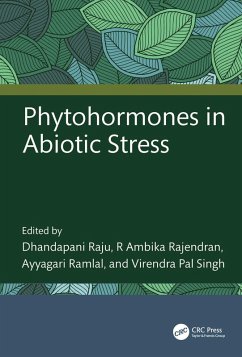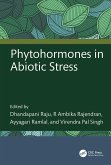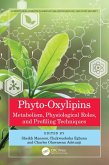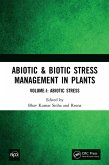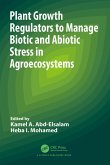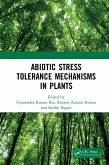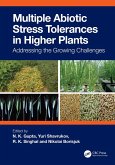Phytohormones in Abiotic Stress (eBook, ePUB)
Redaktion: Raju, Dhandapani; Singh, Virendra Pal; Ramlal, Ayyagari; Rajendran, R Ambika
52,95 €
52,95 €
inkl. MwSt.
Sofort per Download lieferbar

26 °P sammeln
52,95 €
Als Download kaufen

52,95 €
inkl. MwSt.
Sofort per Download lieferbar

26 °P sammeln
Jetzt verschenken
Alle Infos zum eBook verschenken
52,95 €
inkl. MwSt.
Sofort per Download lieferbar
Alle Infos zum eBook verschenken

26 °P sammeln
Phytohormones in Abiotic Stress (eBook, ePUB)
Redaktion: Raju, Dhandapani; Singh, Virendra Pal; Ramlal, Ayyagari; Rajendran, R Ambika
- Format: ePub
- Merkliste
- Auf die Merkliste
- Bewerten Bewerten
- Teilen
- Produkt teilen
- Produkterinnerung
- Produkterinnerung

Bitte loggen Sie sich zunächst in Ihr Kundenkonto ein oder registrieren Sie sich bei
bücher.de, um das eBook-Abo tolino select nutzen zu können.
Hier können Sie sich einloggen
Hier können Sie sich einloggen
Sie sind bereits eingeloggt. Klicken Sie auf 2. tolino select Abo, um fortzufahren.

Bitte loggen Sie sich zunächst in Ihr Kundenkonto ein oder registrieren Sie sich bei bücher.de, um das eBook-Abo tolino select nutzen zu können.
This book aims to highlight these issues and provide scope for the development of resistance in crops against abiotic stresses to maximize yield for the growing population.
- Geräte: eReader
- mit Kopierschutz
- eBook Hilfe
Andere Kunden interessierten sich auch für
![Phytohormones in Abiotic Stress (eBook, PDF) Phytohormones in Abiotic Stress (eBook, PDF)]() Phytohormones in Abiotic Stress (eBook, PDF)52,95 €
Phytohormones in Abiotic Stress (eBook, PDF)52,95 €![Phyto-Oxylipins (eBook, ePUB) Phyto-Oxylipins (eBook, ePUB)]() Phyto-Oxylipins (eBook, ePUB)54,95 €
Phyto-Oxylipins (eBook, ePUB)54,95 €![Abiotic & Biotic Stress Management in Plants (eBook, ePUB) Abiotic & Biotic Stress Management in Plants (eBook, ePUB)]() Abiotic & Biotic Stress Management in Plants (eBook, ePUB)53,95 €
Abiotic & Biotic Stress Management in Plants (eBook, ePUB)53,95 €![Plant Growth Regulators to Manage Biotic and Abiotic Stress in Agroecosystems (eBook, ePUB) Plant Growth Regulators to Manage Biotic and Abiotic Stress in Agroecosystems (eBook, ePUB)]() Plant Growth Regulators to Manage Biotic and Abiotic Stress in Agroecosystems (eBook, ePUB)52,95 €
Plant Growth Regulators to Manage Biotic and Abiotic Stress in Agroecosystems (eBook, ePUB)52,95 €![Metabolic Adaptations in Plants During Abiotic Stress (eBook, ePUB) Metabolic Adaptations in Plants During Abiotic Stress (eBook, ePUB)]() Metabolic Adaptations in Plants During Abiotic Stress (eBook, ePUB)49,95 €
Metabolic Adaptations in Plants During Abiotic Stress (eBook, ePUB)49,95 €![Abiotic Stress Tolerance Mechanisms in Plants (eBook, ePUB) Abiotic Stress Tolerance Mechanisms in Plants (eBook, ePUB)]() Abiotic Stress Tolerance Mechanisms in Plants (eBook, ePUB)54,95 €
Abiotic Stress Tolerance Mechanisms in Plants (eBook, ePUB)54,95 €![Multiple Abiotic Stress Tolerances in Higher Plants (eBook, ePUB) Multiple Abiotic Stress Tolerances in Higher Plants (eBook, ePUB)]() Multiple Abiotic Stress Tolerances in Higher Plants (eBook, ePUB)52,95 €
Multiple Abiotic Stress Tolerances in Higher Plants (eBook, ePUB)52,95 €-
-
-
This book aims to highlight these issues and provide scope for the development of resistance in crops against abiotic stresses to maximize yield for the growing population.
Dieser Download kann aus rechtlichen Gründen nur mit Rechnungsadresse in A, B, BG, CY, CZ, D, DK, EW, E, FIN, F, GR, HR, H, IRL, I, LT, L, LR, M, NL, PL, P, R, S, SLO, SK ausgeliefert werden.
Produktdetails
- Produktdetails
- Verlag: Taylor & Francis eBooks
- Seitenzahl: 248
- Erscheinungstermin: 14. Juni 2024
- Englisch
- ISBN-13: 9781040027844
- Artikelnr.: 70258144
- Verlag: Taylor & Francis eBooks
- Seitenzahl: 248
- Erscheinungstermin: 14. Juni 2024
- Englisch
- ISBN-13: 9781040027844
- Artikelnr.: 70258144
- Herstellerkennzeichnung Die Herstellerinformationen sind derzeit nicht verfügbar.
Dr Dhandapani Raju is a Senior Scientist of Plant Physiology in the Division of Physiology, Indian Agricultural Research Institute (ICAR-IARI), Delhi, India. He completed his under graduation in Agriculture from Tamil Nadu Agricultural University (TNAU), Tamil Nadu, India. He pursued his post-graduation in agriculture with a specialization in plant physiology from C. S. Azad University of Agriculture and Technology, Uttar Pradesh, India. He completed his doctoral degree in plant physiology from the Indian Agricultural Research Institute. He has been awarded "young scientist" by the Indian Society of Plant Physiology, New Delhi, India for his outstanding work on phenotyping banana fruits and identifying vitamin A enrichment gene (phytoene synthase gene) first time in bananas. His academic achievements are evident from possessing various awards, scholarships and merit medals (book prizes, ICAR-JRF, IARI-SRF & ICAR-ARS) at the national level during post-graduation education. He is the recipient of several best poster and oral presentation awards at the national level. Through agricultural research and development, he has invented five technologies, registered three international patents and published more than 15 peer-reviewed articles in both international and national journals of repute. He has currently working on high throughput phenotyping of rice plants for drought tolerance for the last four years. He has hands-on experience in the phenotyping of whole-plant transpiration and developed the software for automatic and near real-time estimation of WUE in rice. He has hands-on experience in both structural and functional genomics techniques for nucleic acid isolation, quality testing and gene expression analysis. He is also involved in teaching and guiding students at the post-graduation level. He has guided 09 MSc students to date. He has conducted three national-level trainings for professionals at state and central levels. Currently, he is working on a national-level multi-institutional project on plant phenomics to develop rice and wheat varieties with improved water use efficiency and nitrogen use efficiency. Dr R Ambika Rajendran is a Senior Scientist of Plant Breeding in the Division of Genetics, Indian Agricultural Research Institute (ICAR-IARI), Delhi, India. She earned her Bachelors from Tamil Nadu Agricultural University (TNAU), Tamil Nadu, India in 2003, her Masters from Kerala Agricultural University (KAU), Kerala, India in 2005 and obtained her doctorate in 2010 from Tamil Nadu Agricultural University (TNAU). She joined the Directorate of Maize Research (DMR), New Delhi (currently referred to as Indian Institute of Maize Research IIMR, Punjab, India) in 2009 till 2016 later she joined the Division of Genetics, IARI as a scientist in a senior scale in 2016. She has over fifteen years of research experience. She currently works in abiotic stress tolerance and doubled haploidy in soybeans. She worked in maize breeding for high oil along with baby corn. Her significant research includes heterotic grouping and patterning of quality protein maize using molecular markers, in vitro mutagenesis in rice and identification of sources of high oil post- Fusarium stalk rot resistance genetic stocks in maize and identification of tolerant sources for pre-germination anaerobic stress tolerance in soybean. She has edited two books namely "Genetics and Breeding in Pulses" and "Handbook of Cereals" and also served as an editor for a book on "Soybean". She has many peer-reviewed research articles published in journals of international and national repute and book chapters to her credit. She is also serving as a reviewer in various national and international journals. Mr Ayyagari Ramlal is a doctoral scholar at the School of Biological Science, Universiti Sains Malaysia, Malaysia. He completed his Bachelor's and Master's in Botany from the University of Delhi, Delhi, India in 2017 and 2020, respectively. He has worked as a Junior Research Fellow at the Division of Genetics, Indian Agricultural Research Institute (ICAR-IARI), Delhi, India and Banaras Hindu University (BHU), Uttar Pradesh, India. He also worked on an innovation research project initiated by the University of Delhi. He has received the Young and Best Author awards from different societies/organizations in India. He has published more than 15 peer-reviewed research and review articles in international journals of repute and many book chapters. He served as an editor for a book on "Soybean" and also serving as a reviewer for many international and national journals. Dr Virendra Pal Singh completed his PhD in Plant Physiology and has over 35 years of research and 27 years of teaching experience. His areas of specialization include post-harvest and seed physiology, abiotic stress and climate change. He is a fellow at the Indian Society for Plant Physiology and served as the editor of the Indian Journal of Plant Physiology for nine years and national consulting editor for the Advances in Plant Physiology series (10 volumes). He is a gold medallist in MSc in Botany with a specialisation in plant physiology. He was awarded a Council of Scientific and Industrial Research (CSIR) fellowship for PhD and Post-Doctoral. He was awarded the Emeritus Professorship by the Indian Council of Agricultural Research (ICARI), Delhi, India. He worked on an Indo-US project on tropical climate. He has supervised 9 PhD and 3 MSc students and trained many agricultural research service (ARS) scientists. He served as an advisor in various committees of Agricultural Universities and Institutes and Staff Selection Commission, India. He has more than a hundred publications to his credit.
Unit I: Introduction
Chapter 1: Hormones: biosynthesis to roles in plants
Chapter 2: Plant hormones mediated alleviation of abiotic stress
Chapter 3: Recent discoveries and prospects of phytohormones
Unit II: Phytohormones in abiotic stresses
Section I: Traditional phytohormones
Chapter 4: Role of abscisic acid in abiotic stresses
Chapter 5: Auxins in abiotic stresses
Chapter 6: Regulatory role of cytokinin in abiotic stress tolerance of
plants
Chapter 7: Ethylene in abiotic stresses
Chapter 8: Roles of gibberellic acid in abiotic stresses
Section II: Non-traditional phytohormones
Chapter 9: Role of brassinosteroids in abiotic stresses
Chapter 10: Indoleamines in abiotic stresses
Chapter 11: Jasmonic acid: A critical player in abiotic stress
Chapter 12: Roles of karrikins in abiotic stresses
Chapter 13: Nitric oxide and its roles in dealing with abiotic stress
Chapter 14: Responses of oxylipins to abiotic stresses
Chapter 15: Role of polyamines in abiotic stresses
Chapter 16: Peptide hormones with emphasis on abiotic stress tolerance in
plants
Chapter 17: Role of salicylic acid in abiotic stresses
Chapter 18: Strigolactones: Mediator in abiotic stress responses
Unit III: Molecular interactions and future prospects
Chapter 19: Signalling transduction, molecular interactions and crosstalk
of hormones during abiotic stress
Chapter 20: Engineering phytohormones for development of tolerant varieties
Chapter 21: Phytohormones: Past, Present and Future
Chapter 1: Hormones: biosynthesis to roles in plants
Chapter 2: Plant hormones mediated alleviation of abiotic stress
Chapter 3: Recent discoveries and prospects of phytohormones
Unit II: Phytohormones in abiotic stresses
Section I: Traditional phytohormones
Chapter 4: Role of abscisic acid in abiotic stresses
Chapter 5: Auxins in abiotic stresses
Chapter 6: Regulatory role of cytokinin in abiotic stress tolerance of
plants
Chapter 7: Ethylene in abiotic stresses
Chapter 8: Roles of gibberellic acid in abiotic stresses
Section II: Non-traditional phytohormones
Chapter 9: Role of brassinosteroids in abiotic stresses
Chapter 10: Indoleamines in abiotic stresses
Chapter 11: Jasmonic acid: A critical player in abiotic stress
Chapter 12: Roles of karrikins in abiotic stresses
Chapter 13: Nitric oxide and its roles in dealing with abiotic stress
Chapter 14: Responses of oxylipins to abiotic stresses
Chapter 15: Role of polyamines in abiotic stresses
Chapter 16: Peptide hormones with emphasis on abiotic stress tolerance in
plants
Chapter 17: Role of salicylic acid in abiotic stresses
Chapter 18: Strigolactones: Mediator in abiotic stress responses
Unit III: Molecular interactions and future prospects
Chapter 19: Signalling transduction, molecular interactions and crosstalk
of hormones during abiotic stress
Chapter 20: Engineering phytohormones for development of tolerant varieties
Chapter 21: Phytohormones: Past, Present and Future
Unit I: Introduction
Chapter 1: Hormones: biosynthesis to roles in plants
Chapter 2: Plant hormones mediated alleviation of abiotic stress
Chapter 3: Recent discoveries and prospects of phytohormones
Unit II: Phytohormones in abiotic stresses
Section I: Traditional phytohormones
Chapter 4: Role of abscisic acid in abiotic stresses
Chapter 5: Auxins in abiotic stresses
Chapter 6: Regulatory role of cytokinin in abiotic stress tolerance of
plants
Chapter 7: Ethylene in abiotic stresses
Chapter 8: Roles of gibberellic acid in abiotic stresses
Section II: Non-traditional phytohormones
Chapter 9: Role of brassinosteroids in abiotic stresses
Chapter 10: Indoleamines in abiotic stresses
Chapter 11: Jasmonic acid: A critical player in abiotic stress
Chapter 12: Roles of karrikins in abiotic stresses
Chapter 13: Nitric oxide and its roles in dealing with abiotic stress
Chapter 14: Responses of oxylipins to abiotic stresses
Chapter 15: Role of polyamines in abiotic stresses
Chapter 16: Peptide hormones with emphasis on abiotic stress tolerance in
plants
Chapter 17: Role of salicylic acid in abiotic stresses
Chapter 18: Strigolactones: Mediator in abiotic stress responses
Unit III: Molecular interactions and future prospects
Chapter 19: Signalling transduction, molecular interactions and crosstalk
of hormones during abiotic stress
Chapter 20: Engineering phytohormones for development of tolerant varieties
Chapter 21: Phytohormones: Past, Present and Future
Chapter 1: Hormones: biosynthesis to roles in plants
Chapter 2: Plant hormones mediated alleviation of abiotic stress
Chapter 3: Recent discoveries and prospects of phytohormones
Unit II: Phytohormones in abiotic stresses
Section I: Traditional phytohormones
Chapter 4: Role of abscisic acid in abiotic stresses
Chapter 5: Auxins in abiotic stresses
Chapter 6: Regulatory role of cytokinin in abiotic stress tolerance of
plants
Chapter 7: Ethylene in abiotic stresses
Chapter 8: Roles of gibberellic acid in abiotic stresses
Section II: Non-traditional phytohormones
Chapter 9: Role of brassinosteroids in abiotic stresses
Chapter 10: Indoleamines in abiotic stresses
Chapter 11: Jasmonic acid: A critical player in abiotic stress
Chapter 12: Roles of karrikins in abiotic stresses
Chapter 13: Nitric oxide and its roles in dealing with abiotic stress
Chapter 14: Responses of oxylipins to abiotic stresses
Chapter 15: Role of polyamines in abiotic stresses
Chapter 16: Peptide hormones with emphasis on abiotic stress tolerance in
plants
Chapter 17: Role of salicylic acid in abiotic stresses
Chapter 18: Strigolactones: Mediator in abiotic stress responses
Unit III: Molecular interactions and future prospects
Chapter 19: Signalling transduction, molecular interactions and crosstalk
of hormones during abiotic stress
Chapter 20: Engineering phytohormones for development of tolerant varieties
Chapter 21: Phytohormones: Past, Present and Future
